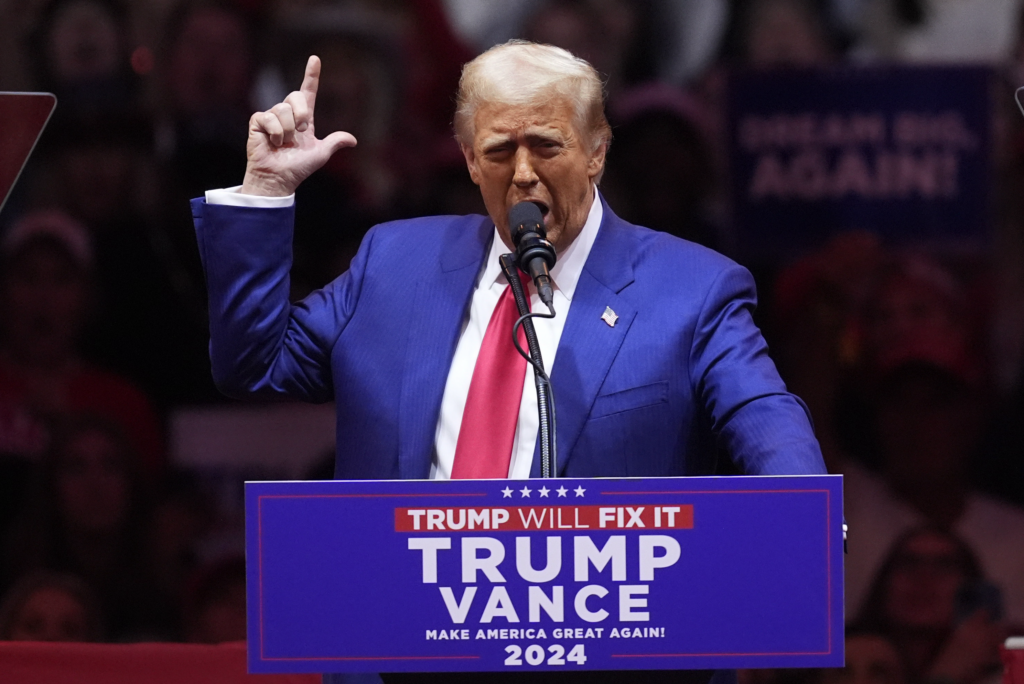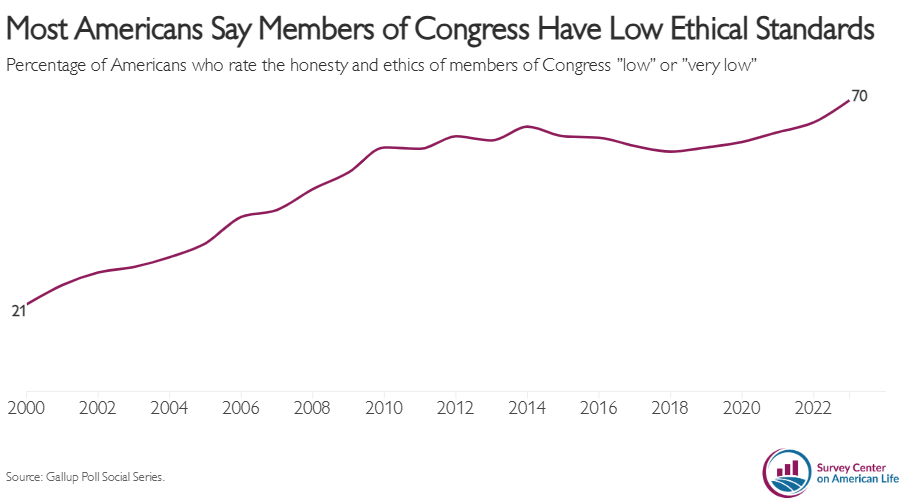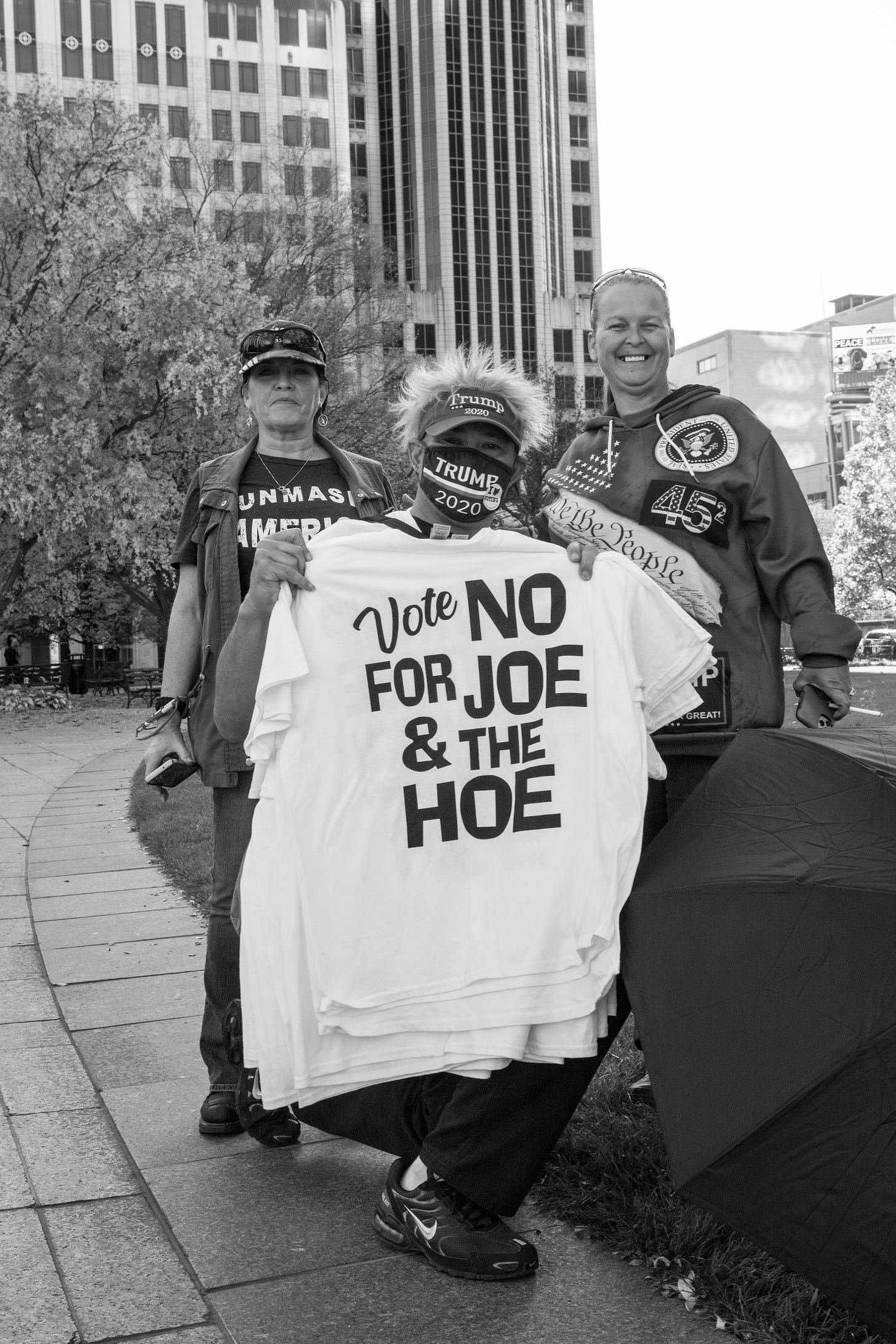Newsletter October 31, 2024
What Trump Has Done to Our Politics

Watching the clips from Trump’s Madison Square Garden rally, what struck me more than anything else is how utterly unrecognizable the Republican Party has become under Trump. A party that once stressed the importance of honesty and integrity is gone. The rally speakers engaged in unrestrained vitriol and bigotry.
It’s not all happening on stage either.
The Washington Post interviewed Craig Dumas, a T-shirt vendor at one of Trump’s campaign events. His best seller? “Say No to the Hoe.” Variations of this message can be found at Trump rallies around the country. When the Post reporters talked with Brian Howard, a Trump rally-attendee, about his “Joe and the Hoe Gotta Go” T-shirt, he replied: “We can joke. We can wear crude shirts. Everybody here is having a good time.”
Hilarious.
How much is Trump to blame for the type of nasty, derogatory rhetoric that has become a mainstay of American politics? I would argue more than a little.
But worse than the normalization of casual cruelty is the way Trump has subverted the importance of character in politics. In our late summer poll, we found that 44 percent of Americans believe he committed sexual assault. A Marquette Law School poll conducted over the summer found that 62 percent of voters believe Trump is corrupt. Only 41 percent of voters believe Trump could be described as honest and trustworthy. Even a quarter of Republicans do not believe Trump is honest.
Most Americans who are supporting Trump recognize that he has deep personality flaws, that he is not a good role model. The central animating question of the Trump era has always been: How can so many Americans support Trump for the country’s highest office when so many Americans have such a low opinion of his character?
All Politicians Are Corrupt and Dishonest
From the very beginning of Trump’s political career, he has sought to position himself as a brash outsider against a corrupt, effete establishment. At the same time, he never promised to restore honor and dignity to the presidency. Rather, he promised to wade into the swamp and fight dirty. Plenty of Americans were receptive to the message.
It’s not hard to see why.
Trust in government has plummeted over the past few decades. Part of the reason this happened is that Americans increasingly view their elected leaders as unethical. This is a fairly recent phenomenon. Twenty years ago, only about one in four Americans rated the honesty of members of Congress as low or very low. Most Americans rated the honesty of their elected officials as average, and one in five rated it as above average. Today, most Americans do not believe members of Congress are honest or ethical. In 2023, seventy percent of the public rated the honesty and integrity of congressmembers as low or very low. That’s a massive change and it has profound implications on the voting decisions Americans make. If elected officials are viewed as universally dishonest, then integrity is no longer a useful metric in assessing their worthiness for public office.
Who benefits the most from this? The candidates who are most ethically compromised. Officials who engage in the most egregious acts of public corruption.

Matthew Yglesias made this argument a few years ago. In politics, he argues, corruption and dishonesty are increasingly seen as relative. If Americans believe that politicians are definitionally self-serving and amoral, then it becomes difficult to hold Trump to any standard of behavior. Even if Trump’s graft and self-dealing is more egregious, it amounts to a difference in degree rather than kind.
Polarized Voters Want Pugilistic Politicians
It’s been well documented that Americans have become more polarized over the past couple decades. This has been especially evident in the negative views partisans have about those across the aisle—a phenomenon political scientists define as affective polarization. Republicans and Democrats have come to dislike each other much more in the modern era.
A couple years ago I wrote about the dramatic change occurring among partisans during the Trump presidency. Republicans and Democrats not only believed their opponents were simply wrong or misguided, but that they presented a threat to the nation. In 2017, only about half of Democrats and Republicans believed their opposition represented a threat to the country—a worryingly high number. By 2020, three-quarters of Republicans and nearly two-thirds of Democrats said the other side posed a threat to the country.
More recent polling suggests things may be getting worse. A new poll by Johns Hopkins University found that nearly half of Republicans and Democrats believe the opposing party is “downright evil.” And a recent NBC News survey found that 8 in 10 Democrats and Republicans said their opponents are so dangerous they pose a threat that would destroy America as we know it.
The growing hostility that partisans feel towards their opponents has altered the way voters respond to deficiencies in their party’s candidates. As partisan animosity toward their political opponents grows, Democrats and Republicans become less concerned about the behavior of their own leaders. It becomes easier to overlook disqualifying attributes, because the political alternative is always worse.
It has also led partisans to prioritize candidates who would go after their opponents. If character no longer matters amidst heightened partisan hostilities, an ability and willingness to destroy the other side does. Trump excels at this type of combative politics. He relishes it.
The real tragedy is that more Americans have come to believe that honesty and integrity don’t matter. Trump has convinced many Americans that being a good guy in politics is not only unnecessary, but undesirable. It’s a sign of weakness or capitulation. An unsurprising result is that more Americans discount a candidate’s character when making political choices. In 2011 most Americans believed that elected officials who engaged in immoral acts in their personal lives would not behave ethically in carrying out their public duties. Now, most Americans believe the opposite. The shift is far more pronounced among Republicans, but it’s not exclusive to them.
Whether he wins or loses, Trump’s legacy will be forever wrapped up in his bizarre, belittling and bullying behavior, and how he transformed our expectations for political leaders. When Jeffrey Goldberg, editor in chief of The Atlantic, talked with Jared Kushner about Trump’s behavior, he received a startling reply. “No one can go as low as the president,” Kushner said. “You shouldn’t even try.” It was a compliment.
Except that Kushner was wrong. Trump brought all of us down with him. Trump’s descent down the golden elevator to kick off his 2016 presidential campaign turns out to have been an apt metaphor for where our politics were headed.
It’s not hopeless. There are plenty of Republicans and Democrats who are driven to demand more from our elected leaders. In 2019 former Republican nominee Mitt Romney wrote in the Washington Post: “To a great degree, a presidency shapes the public character of the nation. A president should unite us and inspire us to follow ‘our better angels.’ A president should demonstrate the essential qualities of honesty and integrity, and elevate the national discourse with comity and mutual respect.”
In 2024, the aspiration to bring back a character-driven politics has led some disaffected Republicans to vote for Kamala Harris. But Democrats should look for their own opportunities to support Republicans who share these same goals. In her own closing argument in Washington D.C., Vice President Harris promised to offer a “seat at my table” to her political opponents. She may not get the chance, but if she does, I hope she means it.
Something Scary…
Just in time for Halloween, Chapman University has released its annual Survey of American Fears. As it turns out, public corruption is a top fear for Americans this year. But it’s actually lower than it was in 2020. I wish you all a Happy Halloween!
Read more on American Storylines








